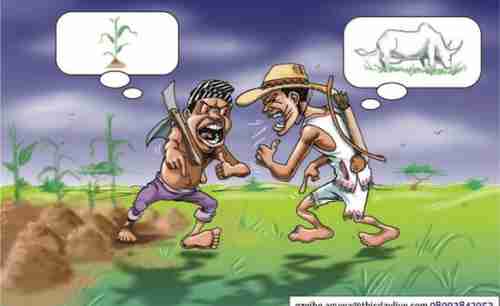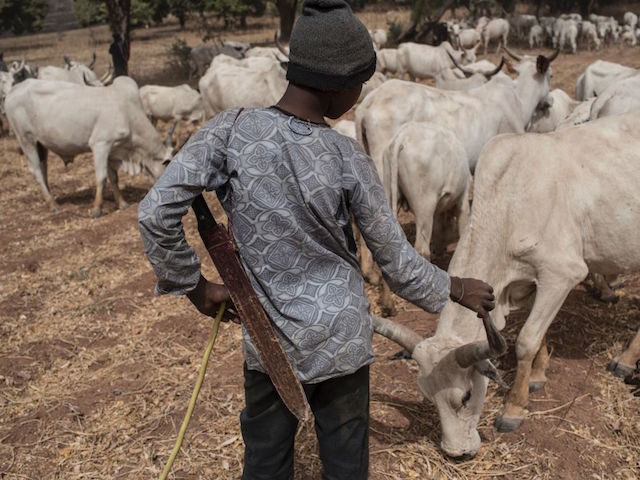This morning’s key headlines from GenerationalDynamics.com
- Tit-for-tat violence between Nigeria’s Muslim herders and Christian farmers becomes more serious
- Nigeria searches for solutions to problem of herders vs farmers
Tit-for-tat violence between Nigeria’s Muslim herders and Christian farmers becomes more serious

Cartoon: Farmer vs Herdsman in Nigeria (AllAfrica)
In what is being called a “harvest of deaths in the new year,” more than 80 people in Benue State province of Nigeria have been killed in just the first ten days of this year in tit-for-tat clashes between farmers and herders. There have been similar clashes in other provinces. In several years of these clashes, there are now more than 80,000 displaced people, forced into refugee camps.
Herders are mostly Muslims from the Fulani tribe. Farmers are mostly Christians from a number of tribes, including the Tiv, Mambila and Bachama tribes.
In a recent incident over the weekend, more than a dozen people were killed. Unidentified gunmen from the Bachama tribe attacked Fulani settlements on Friday, in revenge for previous attacks by Fulanis. On Saturday, Fulanis conducted a reprisal attack. Four Fulanis and eight Bachamas were killed. Residents of the affected village put the death toll at 40, though this could not be verified.
There has been an ongoing stream of these tit-for-tat attacks, which have been getting increasingly violent, leading to fears of a larger war.
Nigeria’s President Muhammadu Buhari is being blamed for the violence, but he says that the problem is caused by population growth. A statement from the president’s office notes that the population of Nigeria was 63 million in 1960 when it achieved independence, and adds:
Today, the population is estimated at close to 200 million, while the land size has not changed and will not change. Urban sprawl and development have simply reduced land area both for peasant farming and cattle grazing.
It is therefore both unfair and unkind for anyone to keep insinuating that the president is condoning the spate of killings in Benue and other neighboring states.
President Buhari has publicly condemned the violence at every turn. He is prepared to permit every possible step that can lead to the stoppage of the killings.
However, Buhari himself is a Hausa-speaking Fulani from northern Nigeria. Although he has repeatedly condemned the deadly clashes as “wicked and callous,” many people in other tribes and political parties suspect him of supporting the attacks for political gain.
Nonetheless, from the point of view of Generational Dynamics, Buhari is correct. Conflicts between herders and farmers are common in many countries, and I’ve described them in Central African Republic, Rwanda, Burundi, Kenya, Sudan, South Sudan, and even America in the 1800s. As population grows, the farmers accuse the herders of letting the cattle eat their crops, while the herders accuse the farmers of planting on land that’s meant for grazing. If the farmers put up fences, then the herders knock them down. This Day Live (Nigeria) and AFP
Nigeria searches for solutions to problem of herders vs farmers
In order to stop the violence, the governor of Benue State has passed an “Anti-Grazing Law” that came into effect in November, as I reported at the time on the growing violence between herders and farmers in Nigeria. The law prohibits open grazing of cattle and requires herders to maintain their herds of cattle on ranches. As I wrote at the time, the new law is somewhat laughable, as there is no way that it will stop Fulani herder attacks on farmers. And it certainly has not stopped the violence.
The Miyetti Allah Cattle Breeders Association of Nigeria (MACBAN), the lobbying group representing Fulani herders, are blaming the Anti-Grazing Law for increasing violence since the law has encouraged the growth of vigilante farmer groups attacking herders and they cattle.
Another proposed solution is being opposed by MACBAN: The implementation of “cattle colonies” across the country. The herders will be given large blocks of land, having adequate water and pasture for grazing of cattle. A standard cattle colony will also have shopping and supply centers for dairy products, with abattoirs and meat warehouses for processing finished products.
Herders would be restricted to the “cattle colonies,” so it is not surprising that MACBAN opposed them. Furthermore, no matter wonderful promises the politicians make about the colonies, everyone can be sure that herders will be given whatever block of land nobody wants, and herders would become completely marginalized.
The herder association is expressing an entirely different solution – adopt the European system of providing subsidies of a few euros a day for each dairy cow that a farmer or rancher owns and maintains.
These subsidies are part of the European Union’s controversial €58 billion per year Common Agricultural Policy (CAP). Since the UK pays a significant amount of that money, CAP may not survive Brexit intact. Leadership (Nigeria) and The Nation (Nigeria) and Politico (EU)
Related Articles
- Violence in Nigeria grows over clashes between herders and farmers (03-Nov-2017)
- Kenya’s herders attack well-known conservationist, stoking tribal tensions (24-Apr-2017)
- Ban Ki Moon blames Darfur genocide on global warming (19-Jun-2007)
- Press reports say that Tony Blair caving on EU budget (30-Nov-2005)
KEYS: Generational Dynamics, Nigeria, Benue State, Muhammadu Buhari, Hausa, Faluni tribe, Tiv tribe, Mambila tribe, Bachama tribe, Miyetti Allah Cattle Breeders Association of Nigeria, MACBAN, Anti-Grazing law, cattle colonies
Permanent web link to this article
Receive daily World View columns by e-mail

COMMENTS
Please let us know if you're having issues with commenting.